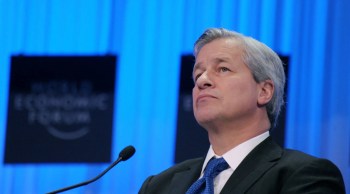CNBC host David Faber will be a guest on Marketplace tonight. I was just listening to the raw interview, and something he said got me going.
Here’s the quote:
Mortgage-backed securities have been around for a very long period of time and ultimately proved to be quite a positive product in many ways by providing a great deal of money to the ultimate providers of mortgages, money that they could then use to go out and sell more mortgages. That being said, as so often seems to be the case on Wall Street, things become perverted beyond their original intent, and that unfortunately, seems to have happened with securitization.
As I’ve read the many columns about big profits at Goldman (and now, JP Morgan), I’ve tried to keep an open mind about what they mean. Is it a good sign that some banks are healthy? Does it necessarily mean the taxpayers were ripped off? Questions like that. And when David said securities were positive because they provided a great deal of money to the providers of mortgages, I thought about what Matt Taibbi wrote in his latest rant against Goldman:
What’s wrong is that this is not free-market earnings but an almost pure state subsidy.
Last year, when Hank Paulson told us all that the planet would explode if we didn’t fork over a gazillion dollars to Wall Street immediately, the entire rationale not only for TARP but for the whole galaxy of lesser-known state crutches and safety nets quietly ushered in later on was that Wall Street, once rescued, would pump money back into the economy, create jobs, and initiate a widespread recovery. This, we were told, was the reason we needed to pilfer massive amounts of middle-class tax revenue and hand it over to the same guys who had just blown up the financial world. We’d save their asses, they’d save ours. That was the deal.
It turned out not to happen that way. We constructed this massive bailout infrastructure, and instead of pumping that free money back into the economy, the banks instead simply hoarded it and ate it on the spot, converting it into bonuses. So what does this Goldman profit number mean? This is the final evidence that the bailouts were a political decision to use the power of the state to redirect society’s resources upward, on a grand scale. It was a selective rescue of a small group of chortling jerks who must be laughing all the way to the Hamptons every weekend about how they fleeced all of us at the very moment the game should have been up for all of them.
I thought about what Robert Scheer wrote at The Nation this week on the repeal of the Glass-Steagall Act, which opened the door to a whole new world of banking activity:
While some now play down the significance of this radical deregulation, not so Goldman Sachs CEO Lloyd C. Blankfein–at least not back in June 2007, when the markets were still doing well. “If you take an historical perspective,” Blankfein told the New York Times by way of explaining his company’s spectacular success at the time, “we’ve come full circle, because that is exactly what the Rothschilds or J.P. Morgan the banker were doing in their heyday. What caused an aberration was the Glass-Steagall Act.”
That 1933 act was repealed in a law signed by President Bill Clinton at Rubin’s urging, and in the following eight years Goldman Sachs recorded a 265 percent growth in its balance sheet. “Back then,” the Wall Street Journal reports, “Goldman was churning out profits by trading credit derivatives, speculating on currencies and oil and placing big bets [on] the stock market.”
Big bets made in a casino designed by Goldman, which now makes money off loans to the victims. High on the list of victims are state governments that have to turn to Goldman for money because the federal government that saved the banks won’t do the same for the states, which have watched their tax bases shrink because of the banking meltdown. As the WSJ noted, “issuing debt to ailing governments” is now a growth industry for Goldman.
If Wall Street operated its money-churning exercises in a vacuum, we wouldn’t care about any of this. The bankers would be rich or bust, but it wouldn’t matter to the rest of us.
But that’s not the case. Taibbi sums it up this way:
There are going to be some people who say that some of this stuff isn’t government subsidy so much as ordinary government contracting. After all, do we criticize Boeing for making airplanes or Electric Boat for making submarines during a war? If we don’t do that, then why should we be pissed about Goldman making a profit underwriting TARP repayment stock issuances, or Treasuries?
The difference is that Boeing and Electric Boat didn’t start the war. But these guys on Wall Street caused this crisis, and now they’re raking in money on the infrastructure their buddies in government have devised to bail them out. It’s a self-fulfilling cycle — beautiful, in a way, but at the same time sort of uniquely disgusting. That they’re going to get away with it is bad enough — that they’re getting praised for it, for being such smart guys, is damn near intolerable.
There’s a lot happening in the world. Through it all, Marketplace is here for you.
You rely on Marketplace to break down the world’s events and tell you how it affects you in a fact-based, approachable way. We rely on your financial support to keep making that possible.
Your donation today powers the independent journalism that you rely on. For just $5/month, you can help sustain Marketplace so we can keep reporting on the things that matter to you.


















